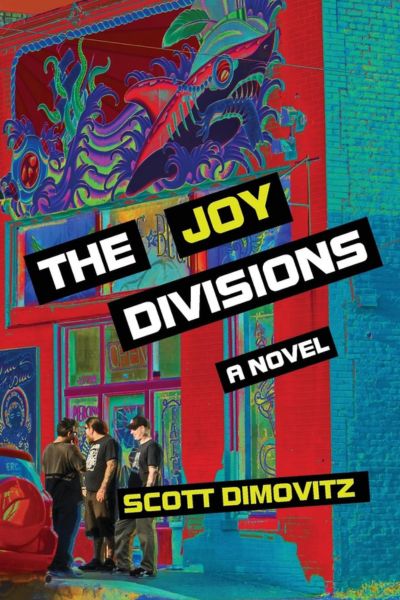Q and A with Prof. Scott Dimovitz as he releases new novel, The Joy Divisions
English Department Chair and Professor Scott Dimovitz plans to release his debut novel, The Joy Divisions, on Nov. 15. Dimovitz spoke with Regis about his process and career.
Q: How long have you been at Regis and the English department?
A: I have taught at Regis since 2008, although I have been teaching college since 1999.
Q: Can you tell us about your book and what inspired you to write The Joy Divisions?
A: It takes place in 1993, when a goth-punk art school dropout named Ed Pullman gets recruited by a group of arty misfits who are trying to save the world through performance art. It is a darkly humorous literary-historical novel and social satire that mixes the private struggles of a young man with a cast of characters from different social strata, all trying to use him in their crusades to save an America that seems to be on the brink of destruction.
I was initially inspired by events that happened in my young adulthood, when the textile factory where my father worked suddenly closed its doors after over 100 years, upending their entire local world. I also wanted to depict a vibrant working-class culture, which often gets stereotyped as a bunch of unintellectual hillbillies rather than as individuals with their own complex interests and passions.
Q: In the description it says: “As Ed and his loving cousin Ester struggle to find their place in a bleakly earnest landscape of guerrilla conceptual art, post-NAFTA labor battles, and burning factories, their hometown marches stoically toward a disaster of biblical proportions.” Do you find what you have written is somewhat similar to what is happening in our world now?
A: I certainly hope so. The protagonist’s search for meaning plays against the sweeping and interlocking social and historical stories of the time. It takes place thirty years ago against the backdrop of the first World Trade Center bombing, the siege at the Branch Davidian Waco cult, and the passage of NAFTA, which devastates Ed’s industrial working-class town. It was a moment in American history when things were changing into the world that we have inherited—a world of religious and political extremism, global capitalism, and an apocalyptic tone to just about every area of life. And it is funny!
Q: Can you tell us about your academic background?
A: Like the novel’s protagonist (who isn’t me!), I was a working-class kid who went to a state school in Pennsylvania, where I majored in English and psychology. I went on to get my Ph.D. in modern and contemporary literature at New York University, where I focused on postmodern literature and film. I’ve written an academic study on the British postmodern feminist novelist, Angela Carter, and most of my research lately has focused the theme of my next book, (Post)Apocalypse Now! Postmodern Literature at the End of Time. I’ve also started prewriting for a new novel.
Q: You have been teaching students for a while now, what kind of advice would you give an aspiring writer who wants to write a book?
A: I’d share one of my best pieces of advice that I heard when I wanted to be a novelist, which is to read as much as you can whenever you can and learn from the best what is possible. All great writers are great readers. Oh, and actually writing words is far better than thinking about writing those words. It took me far too long to apply that to my own fiction writing.
